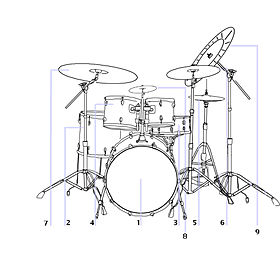Field drum

A drum kit snare drum.
|
|
| Percussion instrument | |
|---|---|
| Other names | Field drum, side drum |
| Classification | |
| Hornbostel–Sachs classification | 211.212.11 (Individual double-skin cylindrical drums, one skin used for playing) |
| Developed | 13th century |
| Related instruments | |
| Tabor | |
| The drum kit |
|
| Not shown |
| See also |
The snare drum or side drum is a percussion instrument that produces a sharp staccato sound when the head is struck with a drum stick, due to the use of a series of stiff wires held under tension against the lower skin. Snare drums are often used in orchestras, concert bands, marching bands, parades, drumlines, drum corps, and more. It is one of the central pieces in a drum set, a collection of percussion instruments designed to be played by a seated drummer, which is used in many genres of music. Snare drums are usually played with drum sticks, but other beaters such as the brush or the rute can be used to achieve very different sounds. The snare drum is a versatile and expressive percussion instrument due its sensitivity and responsiveness. The sensitivity of the snare drum allows it to respond audibly to the softest strokes, even with a wire brush; as well, it can be used for complex rhythmic patterns and engaging solos at moderate volumes. Its high dynamic range allows the player to produce powerful accents with vigorous strokes and a thundering crack (120+ dB) when rimshot strokes are used.
The snare drum originates from the tabor, a drum first used to accompany the flute. The tabor evolved into more modern versions, such as the kit snare, marching snare, tarol snare, and piccolo snare. Each type presents a different style of percussion and size. The snare drum that one might see in a popular music concert is usually used in a backbeat style to create rhythm. In marching bands, it can do the same but is used mostly for a front beat. In comparison with the marching snare, the kit snare is generally smaller in length, while the piccolo is the smallest of the three. The snare drum is easily recognizable by its loud cracking sound when struck firmly with a drum stick or mallet. The depth of the sound varies from snare to snare because of the different techniques and construction qualities of the drum. Some of these qualities are head material and tension, dimensions, and rim and drum shell materials and construction.
...
Wikipedia


